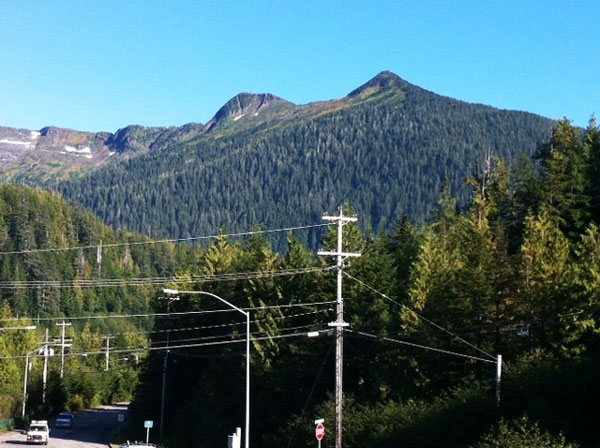
A locator beacon turned what could have been a long, drawn-out, overnight search operation on Ketchikan’s Deer Mountain into a quick and successful afternoon rescue.
Three hikers took a wrong turn on the Deer Mountain Trail Wednesday afternoon, and ended up stuck in a canyon. They tried scrambling up the steep cliff, which was covered in loose rock, but succeeded only in getting cuts and scrapes all over their legs.
Luckily, though, before starting the hike, they had the foresight to borrow one of Ketchikan Volunteer Rescue Squad’s SPOT locator beacons, available free of charge to hikers. When they realized they couldn’t get out on their own, they activated the beacon.
KVRS spokesman Jerry Kiffer says the group got a call at about 1:30 p.m. Wednesday, letting the organization know that an emergency signal had been received.
“We checked with our trip plan and indeed we did have a beacon,” he said. “That particular beacon was loaned out to some visitors. They were actually up here working for the summer. We had a trip plan that indicated they were going to spend the night at Deer Mountain cabin and then the next day they were going to traverse over to Silvis Lake and then come out the Silvis Lake Trail.”
KVRS quickly dispatched a helicopter with a rescue crew, which flew directly to the GPS coordinates transmitted by the locator beacon. And about 45 minutes after the hikers got into trouble, they were found.
“So the crew was able to land the helicopter close to them, close enough to pick them up and then we moved them back up onto the trail,” he said. “Because they could navigate on their own, they were able to walk out on their own, we dropped them off on the trail and left one of our mountain rescue members with them to escort them out the Silvis Lake drainage and out the trail to the road.”
Kiffer says the three hikers, two 23-year-old men and one 23-year-old woman, were in good shape other than some cuts.
This rescue marks the first time that one of the KVRS locator beacons was activated for a rescue, and Kiffer says the group is happy with the successful outcome. The beacons have been available for hikers to check out for about two years, and were the squad’s response to a growing problem.
“Several years ago, we started identifying a lot of activity up on Deer Mountain, and we were getting an increase of rescues on Deer Mountain, primarily as a result of newer folks, people that are unfamiliar with the area, visitors, cruise ship passengers and the like,” he said.
KVRS bought the small, lightweight beacons that use satellite global positioning system technology to track a hiker’s progress. If hikers get into trouble, they just have to press the SOS button.
“They’re free of charge,” he said. “We loan these out to anyone who wants them. We highly encourage everybody that goes in the backcountry to take one. All that’s required is you fill out a real brief trip plan, who you are, where you’re going, when you’re going to come back, and what you’re taking with you, what you plan on doing, then just turn on the beacon and go have fun.”
If a hiker isn’t able to activate a beacon, KVRS still could use a beacon’s automatic tracking signal to get a good idea of the hiker’s general location.
Kiffer says that KVRS has 22 beacons available for people to check out, with some at the Visitors Center on the dock, at the Alaska State Troopers, and directly through KVRS. They probably will need to buy more soon.
“It’s a program that’s growing in size very quickly as the word gets out,” he said. “With the successful rescue yesterday, that just hammers home the point that these things really do work.”
Kiffer says beacons not only reduce the time and risk for hikers in trouble, they also can reduce the rescue group’s cost and liability when performing a rescue.
From activating the signal to walking out, the ordeal for Wednesday’s lost hikers lasted about five hours. That’s not bad for a mishap in Alaska’s back-country.




